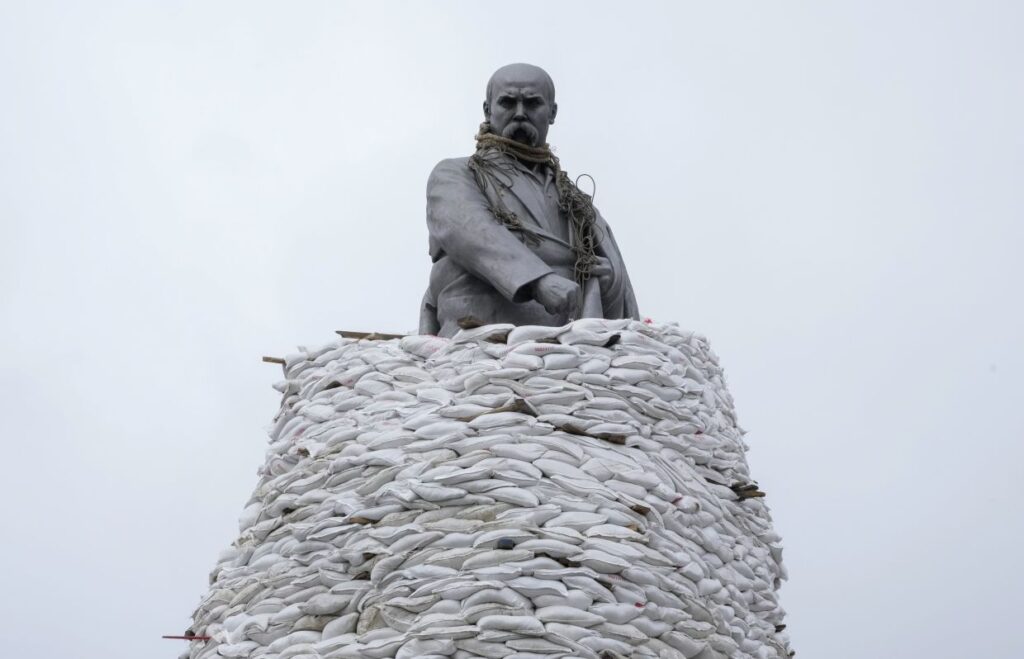
Wednesday
Three weeks ago, drawing on a New Yorker article and my own knowledge of Russian literature, I speculated that Russia has invaded Ukraine in part for a sentimental attachment that can be found tin various Russian novels and poems. As it turns out, I didn’t know the half of it. Kamil Galeev, a fellow at the Wilson Center, explains that the issue goes much deeper, although poets are still at the heart of it. Galeev’s very long twitter thread identifies Russian poet Alexander Pushkin and Ukrainian Taras Shevchenko as the two main combatants in the struggle over Ukrainian identity.
It all has to do with language. Pushkin is considered the father of the Russian language and Shevchenko of the Ukrainian language. In “On Ukrainian Independence,” a horrifying poem in light of recent events, Joseph Brodsky reveals Russian views. In the eyes of this poet, who fled the Soviet Union and went on to win the Nobel Prize, Pushkin is a true poet, Shevchenko a bullshitter.
Reveling in the thought of Ukrainians (whom he describes as fascists) regretting their choice to leave Russia, Brodsky predicts that they will turn to the Russian poet, not the Ukrainian, when they’re on their deathbeds:
God rest ye merry Cossacks, hetmans, and gulag guards!
But mark: when it’s your turn to be dragged to graveyards,
You’ll whisper and wheeze, your deathbed mattress a-pushing,
Not Shevchenko’s bullshit but poetry lines from Pushkin.
Galeev explains that Brodsky, like many Russians, believes that Ukrainians are actually Russians and that Ukraine is a farce. He observes,
What is interesting here is not so much the supposed superiority of Russians over Ukrainians. It’s the politicization of literature, specifically of poetry. Which poet you admire and quote is not neutral politics-wise. It’s the most important political question ever.
Galeev’s explanation is long and intricate but basically it comes down to the relationship between the Russian language and the Russian state. When Catherine the Great was attempting to homogenize all East Slavic Territories in the 18th century, the question arose as to which version of Russian it should impose. Before Pushkin, Russia didn’t have a single literary standard. After Pushkin, it did:
Pushkin created the modern Russian language in a sense that he created that version of Russian that would be later imposed by the authority of the state. That’s why he became the most impactful Russian author and why modern Russians can hardly read pre-Pushkin literature.
Having chosen Pushkin’s Russian to impose on Belarus and Ukraine, Russia could not tolerate a Ukrainian alternative. By showing that Ukrainian could also produce great literature, Shevchenko presented an existential threat.
Galeev sets forth the two men’s different views towards the Russian imperial tradition. First Pushkin, whose words are chilling:
Pushkin was super hawkish. During the Polish rebellion of 1830 he wrote: “We can only pity the Poles. We are too strong to hate them and this war will be the war of annihilation or at least it should be” “Poles should be strangled, our slowness is painful”
Pushkin celebrated the genocides of the Caucasian war: “I’ll sing about you, the hero, Oh Kotlyarevsky, the scourge of Caucasus ! Wherever you went like a storm Your advance like a black plague, Destroyed, exterminated the tribes”
Pushkin accepted Russian imperial identity as his own identity. He fully endorsed Russian imperialism and any criticism of it triggered him. Consider his poem “To the slanderers of Russia” against the French politicians who supported the Polish rebellion of 1830.”
According to Galeev, there are currently Russian movie stars who are reading Pushkin aloud as a justification for the current invasion.
Shevchenko, on the other hand, pushed back against Russia’s imperial ambitions:
While Pushkin celebrated Russian militarism, Shevchenko criticized it. He sympathized with the mountaineers fighting against the Russian conquest, lamented the losses of Russian conscripts. While human misery meant nothing to Pushkin, it was highly important for Shevchenko
In the two poets, Galeev writes, one finds very different visions of individualism. For Pushkin, fulfillment lies in subordinating yourself to the Russian state:
Consider how Pushkin advertised the benefits of the Russian rule:
Submit, Cherkes! Both West and East
May soon share your fate;
When the time comes, you’ll say arrogantly:
Yes, I’m a slave but a slave of the Tsar of the World!”
Understandably, Shevchenko was not impressed:
No wonder Shevchenko mocked Pushkin so mercilessly. For a holder of Ukrainian cultural memes, Russian cultural memes looked absolutely disgusting, more like a zombie creed than as a human culture. For Shevchenko Russian empire was the evil to be destroyed
Galeev concludes that cultural uniformity is the real goal of the current war. “The problem with Ukraine,” he writes, “is that it exists.” This view is so deeply embedded in many Russians that they are willing to countenance the absolute destruction of the country to achieve that unity.
When the city of Kharkiv surrounds a thirty-foot statue of Shevchenko with sandbags, it is protecting more than just a statue.

